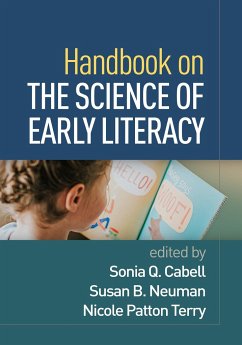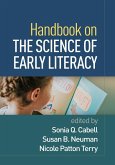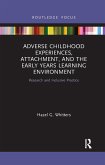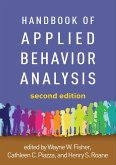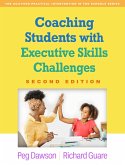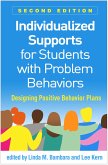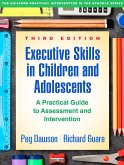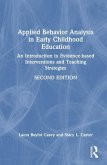Handbook on the Science of Early Literacy
Herausgeber: Patton Terry, Nicole; Neuman, Susan B.; Cabell, Sonia Q.
Handbook on the Science of Early Literacy
Herausgeber: Patton Terry, Nicole; Neuman, Susan B.; Cabell, Sonia Q.
- Gebundenes Buch
- Merkliste
- Auf die Merkliste
- Bewerten Bewerten
- Teilen
- Produkt teilen
- Produkterinnerung
- Produkterinnerung
Recent years have seen an explosion of interest in the use of computerized text analysis methods to address basic psychological questions. This comprehensive handbook brings together leading language analysis scholars to present foundational concepts and methods for investigating human thought, feeling, and behavior using language. Contributors work toward integrating psychological science with natural language processing (NLP) and machine learning. Ethical issues in working with natural language datasets are discussed. The volume showcases applications in areas including interpersonal…mehr
Andere Kunden interessierten sich auch für
![Handbook on the Science of Early Literacy Handbook on the Science of Early Literacy]() Handbook on the Science of Early Literacy60,99 €
Handbook on the Science of Early Literacy60,99 €![Adverse Childhood Experiences, Attachment, and the Early Years Learning Environment Adverse Childhood Experiences, Attachment, and the Early Years Learning Environment]() Hazel G. WhittersAdverse Childhood Experiences, Attachment, and the Early Years Learning Environment32,99 €
Hazel G. WhittersAdverse Childhood Experiences, Attachment, and the Early Years Learning Environment32,99 €![Handbook of Applied Behavior Analysis Handbook of Applied Behavior Analysis]() Handbook of Applied Behavior Analysis97,99 €
Handbook of Applied Behavior Analysis97,99 €![Coaching Students with Executive Skills Challenges, Second Edition Coaching Students with Executive Skills Challenges, Second Edition]() Peg Dawson (Center for Learning and United Sta Attention DisordersCoaching Students with Executive Skills Challenges, Second Edition52,99 €
Peg Dawson (Center for Learning and United Sta Attention DisordersCoaching Students with Executive Skills Challenges, Second Edition52,99 €![Individualized Supports for Students with Problem Behaviors, Second Edition Individualized Supports for Students with Problem Behaviors, Second Edition]() Individualized Supports for Students with Problem Behaviors, Second Edition73,99 €
Individualized Supports for Students with Problem Behaviors, Second Edition73,99 €![Executive Skills in Children and Adolescents Executive Skills in Children and Adolescents]() Peg DawsonExecutive Skills in Children and Adolescents62,99 €
Peg DawsonExecutive Skills in Children and Adolescents62,99 €![Applied Behavior Analysis in Early Childhood Education Applied Behavior Analysis in Early Childhood Education]() Laura Baylot CaseyApplied Behavior Analysis in Early Childhood Education152,99 €
Laura Baylot CaseyApplied Behavior Analysis in Early Childhood Education152,99 €-
-
-
Recent years have seen an explosion of interest in the use of computerized text analysis methods to address basic psychological questions. This comprehensive handbook brings together leading language analysis scholars to present foundational concepts and methods for investigating human thought, feeling, and behavior using language. Contributors work toward integrating psychological science with natural language processing (NLP) and machine learning. Ethical issues in working with natural language datasets are discussed. The volume showcases applications in areas including interpersonal relationships, personality, morality, deception, social biases, political psychology, and psychopathology.
Hinweis: Dieser Artikel kann nur an eine deutsche Lieferadresse ausgeliefert werden.
Hinweis: Dieser Artikel kann nur an eine deutsche Lieferadresse ausgeliefert werden.
Produktdetails
- Produktdetails
- Verlag: Guilford Publications
- Seitenzahl: 436
- Erscheinungstermin: 14. Juni 2023
- Englisch
- Abmessung: 184mm x 263mm x 35mm
- Gewicht: 982g
- ISBN-13: 9781462551545
- ISBN-10: 1462551548
- Artikelnr.: 66354037
- Herstellerkennzeichnung
- Libri GmbH
- Europaallee 1
- 36244 Bad Hersfeld
- gpsr@libri.de
- Verlag: Guilford Publications
- Seitenzahl: 436
- Erscheinungstermin: 14. Juni 2023
- Englisch
- Abmessung: 184mm x 263mm x 35mm
- Gewicht: 982g
- ISBN-13: 9781462551545
- ISBN-10: 1462551548
- Artikelnr.: 66354037
- Herstellerkennzeichnung
- Libri GmbH
- Europaallee 1
- 36244 Bad Hersfeld
- gpsr@libri.de
Sonia Q. Cabell, PhD, is Associate Professor in the School of Teacher Education and the Florida Center for Reading Research at Florida State University. Her research focuses on early language and literacy instruction, with a particular interest in the prevention of reading difficulties. Dr. Cabell has authored approximately 80 publications, including peer-reviewed articles, books, book chapters, and early childhood language and literacy curricula. She has served as Principal Investigator or co-Principal Investigator on numerous federally funded grant projects. Dr. Cabell has been an advisor or consultant for a variety of national organizations and state departments of education. She was the 2021 recipient of the International Literacy Association's Diane Lapp & James Flood Professional Collaborator Award (with Tricia Zucker). Previously, Dr. Cabell worked as a second-grade teacher and literacy coach in Oklahoma and Virginia. Susan B. Neuman, EdD, is Professor of Teaching and Learning at New York University. Previously, she was Professor at the University of Michigan and served as the U.S. Assistant Secretary for Elementary and Secondary Education, in which role she established the Early Reading First program and the Early Childhood Educator Professional Development Program, and was responsible for all activities in Title I of the Elementary and Secondary Act. Dr. Neuman has served on the Board of Directors of the International Literacy Association and as coeditor of Reading Research Quarterly. Dr. Neuman has received two lifetime achievement awards for research in literacy development and is a member of the Reading Hall of Fame and a Fellow of the American Educational Research Association. She has published over 100 articles and numerous books. Nicole Patton Terry, PhD, is the Olive and Manuel Bordas Professor of Education in the School of Teacher Education, Director of the Florida Center for Reading Research (FCRR), and Director of the Regional Education Lab-Southeast at Florida State University. Prior to joining FCRR, she was Associate Professor of Special Education at Georgia State University (GSU). Dr. Patton Terry is the founding director of two university-based research entities where researchers collaborate with diverse school and community stakeholders to promote student success: the Urban Child Study Center at GSU and The Village at FCRR. Her work focuses on young learners vulnerable to experiencing difficulty with language and literacy achievement in school; in particular, Black children, children growing up in poverty, and children with disabilities. Previously, Dr. Patton Terry worked as a special education teacher in Illinois.
Foreword, David K. Dickinson Introduction, Sonia Q. Cabell, Susan B. Neuman, and Nicole Patton Terry I. Conceptualizing the Science of Early Literacy 1. Simplicity Meets Complexity: Expanding the Simple View of Reading with the Direct and Indirect Effects Model of Reading, Young-Suk Grace Kim 2. Early Environmental Influences on Language, Meredith L. Rowe, Rachel R. Romeo, and Kathryn A. Leech 3. Prioritizing Dual Language Learners' Language Comprehension Development to Support Later Reading Achievement, Jeannette Mancilla-Martinez 4. Early Literacy, Response to Intervention, and Multi-Tiered Systems of Support, Dayna Russell Freudenthal, Mai W. Zaru, and Stephanie Al Otaiba 5. The Neuroscience of Early Literacy Development, Rachel R. Romeo II. Development and Instruction of Code-Related Literacy Skills 6. Learning the Code, Barbara R. Foorman 7. The Science of Early Alphabet Instruction: What We Do and Do Not Know, Shayne B. Piasta 8. Invented Spelling: An Integrative Review of Descriptive, Correlational, and Causal Evidence, Monique Sénéchal, Gene Ouellette, and H. N. Lam Nguyen 9. Early Spelling Development: Influences, Theory, and Educational Implications, Nenagh Kemp and Rebecca Treiman 10. Supporting Students' Early Writing Development through Data-Based Instruction, Kristen L. McMaster, Seyma Birinci, Emma Shanahan, and Erica Lembke III. Development and Instruction of Meaning-Related Literacy Skills 11. Language Is the Basis of Skilled Reading Comprehension, Laura M. Justice and Hui Jiang 12. Language Interventions in Early Childhood: Summary and Implications from a Multistudy Program of Research, Beth M. Phillips 13. Content Literacy: Integrating Social Studies and Language, Sharolyn D. Pollard-Durodola and Jorge E. Gonzalez 14. Supporting Integrated Instruction in Science and Literacy in K
2 Classrooms, Tanya S. Wright and Amelia Wenk Gotwals 15. Leveraging Content-Rich English Language Arts Instruction in the Early Grades to Improve Children's Language Comprehension, Sonia Q. Cabell and HyeJin Hwang 16. Feeding Two Birds with One Hand: Instructional Simultaneity in Early Literacy Education, Nell K. Duke, Julia B. Lindsey, and Crystal N. Wise 17. Comprehension: From Language to Reading, Ellen Orcutt, Victoria Johnson, and Panayiota Kendeou IV. Using the Science of Early Literacy in Professional Development and Family Engagement 18. Measuring and Improving Teachers' Knowledge in Early Literacy, Anne E. Cunningham, Allison R. Firestone, and Mónica Zegers 19. Professional Development in Early Language and Literacy: Using Data to Balance Effectiveness and Efficiency, Annemarie H. Hindman and Barbara A. Wasik 20. Using the Science of Early Literacy to Design Professional Development for Writing, Hope K. Gerde and Gary E. Bingham 21. Structuring Adaptations for Scaling Up Evidence-Based Literacy Interventions, James S. Kim and Douglas Mosher 22. Together We Can Do So Much: Aligned School and Home Efforts Using a Multi-Tiered System of Support Framework, Tricia A. Zucker, Gloria Yeomans-Maldonado, Sarah Surrain, and Susan H. Landry 23. Family Engagement for Early Literacy: Interventions That Promote Family
School Partnerships, Karalynn E. Brown and Susan M. Sheridan V. Using the Science of Early Literacy to Support Equity 24. Literacy Architectures: Making the Case for Systems of Learning and Teaching to Cultivate Readers and Writers in Linguistically Diverse Schools, Emily Phillips Galloway and Nonie K. Lesaux 25. The Development of Early Orthographic Representations in Children: The Lexical Asymmetry Hypothesis and Its Implications for Children with Dyslexia, Donald L. Compton, Laura M. Steacy, Nuria Gutiérrez, Valeria M. Rigobon, Ashley A. Edwards, and Nancy C. Marencin 26. Developmental Language Disorder: What It Is and Why It Matters, Maura Curran and Tiffany Hogan 27. Autism and Early Literacy: The State of the Science, Kelly Whalon and Veronica P. Fleury 28. Multi-Tiered Systems of Support: An Approach for Reducing Disparities in School Readiness and Increasing Equity in Early Literacy and Learning Opportunities for Young Children, Judith J. Carta and Charles R. Greenwood 29. Factors Associated with Black Children's Early Development and Learning, Iheoma U. Iruka, Amber B. Sansbury, Nicole A. Telfer, Nneka Ibekwe-Okafor, Nicole Gardner-Neblett, and Tonia R. Durden VI. Using the Science of Early Literacy to Learn Across Boundaries 30. Early Literacy in Everyday Spaces: Creating Opportunities for Learning, Susan B. Neuman 31. Digital Picture Books: Opportunities and Utilities, Adriana G. Bus and Trude Hoel 32. e-Books with a Digital Dictionary as a Support for Word Learning, Ofra Korat and Ora Segal-Drori 33. Leveraging Research
Practice Partnerships to Support Evidence Use in Early Childhood: Lessons Learned from Atlanta 323, Nicole Patton Terry, Gary E. Bingham, Anita Faust Berryman, Janelle Clay, and Kate Caton Index
2 Classrooms, Tanya S. Wright and Amelia Wenk Gotwals 15. Leveraging Content-Rich English Language Arts Instruction in the Early Grades to Improve Children's Language Comprehension, Sonia Q. Cabell and HyeJin Hwang 16. Feeding Two Birds with One Hand: Instructional Simultaneity in Early Literacy Education, Nell K. Duke, Julia B. Lindsey, and Crystal N. Wise 17. Comprehension: From Language to Reading, Ellen Orcutt, Victoria Johnson, and Panayiota Kendeou IV. Using the Science of Early Literacy in Professional Development and Family Engagement 18. Measuring and Improving Teachers' Knowledge in Early Literacy, Anne E. Cunningham, Allison R. Firestone, and Mónica Zegers 19. Professional Development in Early Language and Literacy: Using Data to Balance Effectiveness and Efficiency, Annemarie H. Hindman and Barbara A. Wasik 20. Using the Science of Early Literacy to Design Professional Development for Writing, Hope K. Gerde and Gary E. Bingham 21. Structuring Adaptations for Scaling Up Evidence-Based Literacy Interventions, James S. Kim and Douglas Mosher 22. Together We Can Do So Much: Aligned School and Home Efforts Using a Multi-Tiered System of Support Framework, Tricia A. Zucker, Gloria Yeomans-Maldonado, Sarah Surrain, and Susan H. Landry 23. Family Engagement for Early Literacy: Interventions That Promote Family
School Partnerships, Karalynn E. Brown and Susan M. Sheridan V. Using the Science of Early Literacy to Support Equity 24. Literacy Architectures: Making the Case for Systems of Learning and Teaching to Cultivate Readers and Writers in Linguistically Diverse Schools, Emily Phillips Galloway and Nonie K. Lesaux 25. The Development of Early Orthographic Representations in Children: The Lexical Asymmetry Hypothesis and Its Implications for Children with Dyslexia, Donald L. Compton, Laura M. Steacy, Nuria Gutiérrez, Valeria M. Rigobon, Ashley A. Edwards, and Nancy C. Marencin 26. Developmental Language Disorder: What It Is and Why It Matters, Maura Curran and Tiffany Hogan 27. Autism and Early Literacy: The State of the Science, Kelly Whalon and Veronica P. Fleury 28. Multi-Tiered Systems of Support: An Approach for Reducing Disparities in School Readiness and Increasing Equity in Early Literacy and Learning Opportunities for Young Children, Judith J. Carta and Charles R. Greenwood 29. Factors Associated with Black Children's Early Development and Learning, Iheoma U. Iruka, Amber B. Sansbury, Nicole A. Telfer, Nneka Ibekwe-Okafor, Nicole Gardner-Neblett, and Tonia R. Durden VI. Using the Science of Early Literacy to Learn Across Boundaries 30. Early Literacy in Everyday Spaces: Creating Opportunities for Learning, Susan B. Neuman 31. Digital Picture Books: Opportunities and Utilities, Adriana G. Bus and Trude Hoel 32. e-Books with a Digital Dictionary as a Support for Word Learning, Ofra Korat and Ora Segal-Drori 33. Leveraging Research
Practice Partnerships to Support Evidence Use in Early Childhood: Lessons Learned from Atlanta 323, Nicole Patton Terry, Gary E. Bingham, Anita Faust Berryman, Janelle Clay, and Kate Caton Index
Foreword, David K. Dickinson Introduction, Sonia Q. Cabell, Susan B. Neuman, and Nicole Patton Terry I. Conceptualizing the Science of Early Literacy 1. Simplicity Meets Complexity: Expanding the Simple View of Reading with the Direct and Indirect Effects Model of Reading, Young-Suk Grace Kim 2. Early Environmental Influences on Language, Meredith L. Rowe, Rachel R. Romeo, and Kathryn A. Leech 3. Prioritizing Dual Language Learners' Language Comprehension Development to Support Later Reading Achievement, Jeannette Mancilla-Martinez 4. Early Literacy, Response to Intervention, and Multi-Tiered Systems of Support, Dayna Russell Freudenthal, Mai W. Zaru, and Stephanie Al Otaiba 5. The Neuroscience of Early Literacy Development, Rachel R. Romeo II. Development and Instruction of Code-Related Literacy Skills 6. Learning the Code, Barbara R. Foorman 7. The Science of Early Alphabet Instruction: What We Do and Do Not Know, Shayne B. Piasta 8. Invented Spelling: An Integrative Review of Descriptive, Correlational, and Causal Evidence, Monique Sénéchal, Gene Ouellette, and H. N. Lam Nguyen 9. Early Spelling Development: Influences, Theory, and Educational Implications, Nenagh Kemp and Rebecca Treiman 10. Supporting Students' Early Writing Development through Data-Based Instruction, Kristen L. McMaster, Seyma Birinci, Emma Shanahan, and Erica Lembke III. Development and Instruction of Meaning-Related Literacy Skills 11. Language Is the Basis of Skilled Reading Comprehension, Laura M. Justice and Hui Jiang 12. Language Interventions in Early Childhood: Summary and Implications from a Multistudy Program of Research, Beth M. Phillips 13. Content Literacy: Integrating Social Studies and Language, Sharolyn D. Pollard-Durodola and Jorge E. Gonzalez 14. Supporting Integrated Instruction in Science and Literacy in K
2 Classrooms, Tanya S. Wright and Amelia Wenk Gotwals 15. Leveraging Content-Rich English Language Arts Instruction in the Early Grades to Improve Children's Language Comprehension, Sonia Q. Cabell and HyeJin Hwang 16. Feeding Two Birds with One Hand: Instructional Simultaneity in Early Literacy Education, Nell K. Duke, Julia B. Lindsey, and Crystal N. Wise 17. Comprehension: From Language to Reading, Ellen Orcutt, Victoria Johnson, and Panayiota Kendeou IV. Using the Science of Early Literacy in Professional Development and Family Engagement 18. Measuring and Improving Teachers' Knowledge in Early Literacy, Anne E. Cunningham, Allison R. Firestone, and Mónica Zegers 19. Professional Development in Early Language and Literacy: Using Data to Balance Effectiveness and Efficiency, Annemarie H. Hindman and Barbara A. Wasik 20. Using the Science of Early Literacy to Design Professional Development for Writing, Hope K. Gerde and Gary E. Bingham 21. Structuring Adaptations for Scaling Up Evidence-Based Literacy Interventions, James S. Kim and Douglas Mosher 22. Together We Can Do So Much: Aligned School and Home Efforts Using a Multi-Tiered System of Support Framework, Tricia A. Zucker, Gloria Yeomans-Maldonado, Sarah Surrain, and Susan H. Landry 23. Family Engagement for Early Literacy: Interventions That Promote Family
School Partnerships, Karalynn E. Brown and Susan M. Sheridan V. Using the Science of Early Literacy to Support Equity 24. Literacy Architectures: Making the Case for Systems of Learning and Teaching to Cultivate Readers and Writers in Linguistically Diverse Schools, Emily Phillips Galloway and Nonie K. Lesaux 25. The Development of Early Orthographic Representations in Children: The Lexical Asymmetry Hypothesis and Its Implications for Children with Dyslexia, Donald L. Compton, Laura M. Steacy, Nuria Gutiérrez, Valeria M. Rigobon, Ashley A. Edwards, and Nancy C. Marencin 26. Developmental Language Disorder: What It Is and Why It Matters, Maura Curran and Tiffany Hogan 27. Autism and Early Literacy: The State of the Science, Kelly Whalon and Veronica P. Fleury 28. Multi-Tiered Systems of Support: An Approach for Reducing Disparities in School Readiness and Increasing Equity in Early Literacy and Learning Opportunities for Young Children, Judith J. Carta and Charles R. Greenwood 29. Factors Associated with Black Children's Early Development and Learning, Iheoma U. Iruka, Amber B. Sansbury, Nicole A. Telfer, Nneka Ibekwe-Okafor, Nicole Gardner-Neblett, and Tonia R. Durden VI. Using the Science of Early Literacy to Learn Across Boundaries 30. Early Literacy in Everyday Spaces: Creating Opportunities for Learning, Susan B. Neuman 31. Digital Picture Books: Opportunities and Utilities, Adriana G. Bus and Trude Hoel 32. e-Books with a Digital Dictionary as a Support for Word Learning, Ofra Korat and Ora Segal-Drori 33. Leveraging Research
Practice Partnerships to Support Evidence Use in Early Childhood: Lessons Learned from Atlanta 323, Nicole Patton Terry, Gary E. Bingham, Anita Faust Berryman, Janelle Clay, and Kate Caton Index
2 Classrooms, Tanya S. Wright and Amelia Wenk Gotwals 15. Leveraging Content-Rich English Language Arts Instruction in the Early Grades to Improve Children's Language Comprehension, Sonia Q. Cabell and HyeJin Hwang 16. Feeding Two Birds with One Hand: Instructional Simultaneity in Early Literacy Education, Nell K. Duke, Julia B. Lindsey, and Crystal N. Wise 17. Comprehension: From Language to Reading, Ellen Orcutt, Victoria Johnson, and Panayiota Kendeou IV. Using the Science of Early Literacy in Professional Development and Family Engagement 18. Measuring and Improving Teachers' Knowledge in Early Literacy, Anne E. Cunningham, Allison R. Firestone, and Mónica Zegers 19. Professional Development in Early Language and Literacy: Using Data to Balance Effectiveness and Efficiency, Annemarie H. Hindman and Barbara A. Wasik 20. Using the Science of Early Literacy to Design Professional Development for Writing, Hope K. Gerde and Gary E. Bingham 21. Structuring Adaptations for Scaling Up Evidence-Based Literacy Interventions, James S. Kim and Douglas Mosher 22. Together We Can Do So Much: Aligned School and Home Efforts Using a Multi-Tiered System of Support Framework, Tricia A. Zucker, Gloria Yeomans-Maldonado, Sarah Surrain, and Susan H. Landry 23. Family Engagement for Early Literacy: Interventions That Promote Family
School Partnerships, Karalynn E. Brown and Susan M. Sheridan V. Using the Science of Early Literacy to Support Equity 24. Literacy Architectures: Making the Case for Systems of Learning and Teaching to Cultivate Readers and Writers in Linguistically Diverse Schools, Emily Phillips Galloway and Nonie K. Lesaux 25. The Development of Early Orthographic Representations in Children: The Lexical Asymmetry Hypothesis and Its Implications for Children with Dyslexia, Donald L. Compton, Laura M. Steacy, Nuria Gutiérrez, Valeria M. Rigobon, Ashley A. Edwards, and Nancy C. Marencin 26. Developmental Language Disorder: What It Is and Why It Matters, Maura Curran and Tiffany Hogan 27. Autism and Early Literacy: The State of the Science, Kelly Whalon and Veronica P. Fleury 28. Multi-Tiered Systems of Support: An Approach for Reducing Disparities in School Readiness and Increasing Equity in Early Literacy and Learning Opportunities for Young Children, Judith J. Carta and Charles R. Greenwood 29. Factors Associated with Black Children's Early Development and Learning, Iheoma U. Iruka, Amber B. Sansbury, Nicole A. Telfer, Nneka Ibekwe-Okafor, Nicole Gardner-Neblett, and Tonia R. Durden VI. Using the Science of Early Literacy to Learn Across Boundaries 30. Early Literacy in Everyday Spaces: Creating Opportunities for Learning, Susan B. Neuman 31. Digital Picture Books: Opportunities and Utilities, Adriana G. Bus and Trude Hoel 32. e-Books with a Digital Dictionary as a Support for Word Learning, Ofra Korat and Ora Segal-Drori 33. Leveraging Research
Practice Partnerships to Support Evidence Use in Early Childhood: Lessons Learned from Atlanta 323, Nicole Patton Terry, Gary E. Bingham, Anita Faust Berryman, Janelle Clay, and Kate Caton Index

